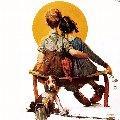Norman Rockwell is one of the best-known American artists of the 20th century.
His illustrations appeared in advertisements, on calendars and most notably on magazine covers.
Rockwell died in 1978. Many Americans collect his art, including two of Hollywood's leading filmmakers. A new exhibit at the Smithsonian American Art Museum showcases works from their collections.
The man in the soft felt hat, kneeling by the reclining woman and supporting her with an arm wrapped around her shoulders bears a striking resemblance to a certain fictional archaeologist.
Perhaps the creator of Indiana Jones was inspired by what he saw in the painting. Peach Crop belongs to producer and director George Lucas. It is one of more than 30 works from his collection in the exhibition "Telling Stories." Other works on display belong to director Steven Spielberg.
"Both Lucas and Spielberg see Rockwell ultimately not just as an illustrator, not just as a maker of pictures, but a teller of visual stories," says Virginia Mecklenburg, curator of the exhibition. She says Lucas told her that he felt comfortable from his earliest days in the movie business, because "he already knew how to tell a story visually from having looked at Norman Rockwell's covers." Rockwell did covers for the Saturday Evening Post for nearly 50 years.
Some of his pictures illustrated stories inside magazines. But even those that didn't do seem to tell a story: a family laden with packages arrives for Christmas at grandma and grandpa's; a little girl in the beauty shop gets her first haircut; a girl balances on one leg, holding her foot and glowering at a blushing boy, while another young couple dance in the background. "One of the things that George Lucas loves about Rockwell is what Rockwell tells us about our culture, about our society, and about who we are as people," Mecklenburg says. She adds that many of the things he sees in Rockwell's pictures remind him of his own childhood in Modesto, California. "He said that he grew up in the Norman Rockwell world. Everything you see in Norman Rockwell pictures, he grew up doing and it was part of his life." George Lucas and Steven Spielberg on the set of 'Raiders of the Lost Ark.' Both filmmakers say Norman Rockwell influenced their storytelling.
Rockwell's moral core Steven Spielberg owns several pictures of Boy Scouts, in part, because he made his first film as a Boy Scout project. But the curator says, he is also interested in what she calls "the moral core" that can be seen in many of Rockwell's images. "He also really admires the pictures of the American military. Spielberg has also collected pictures that remind him of himself, most notably, one titled "And Daniel Boone Comes to Life on the Underwood Portable. " It shows a man at a typewriter and above his head, taking up more than half of the canvas and appearing in a purple cloud, is frontiersman Daniel Boone, wearing his coonskin cap and carrying his long rifle. "When he is starting to write a movie, [Spielberg] says he just sits there at the typewriter waiting for a thought bubble to emerge over his head that will finally get his fingers dancing across the keys," Meckelenburg says. "I think it is also a wonderful demonstration of Rockwell's early fascination with the way movies look. The whole idea looks like a movie screen. It looks like a film playing out over the writer's head." Rockwell in Hollywood Rockwell spent some time in Hollywood in the 1930s. He painted would-be starlets and movie stars like Gary Cooper.
When it came to creating his illustrations, Mecklenburg says, Rockwell approached the job much like a filmmaker.
"When he selected his models, he had them audition to make sure they could do the facial expressions he wanted, that they could act out the body language he wanted for a particular picture," she says. He also selected props and costumes, staged the scene lit it and photographed it. He used the photographs later to create his illustrations Rockwell's attention to detail created images that still tell stories, decades after they were created, much like the films of two of his biggest fans. The largest collection of Rockwell images is at the Norman Rockwell Museum in Stockbridge, MA.

